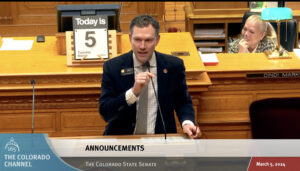Commercial properties would receive gradually increasing tax breaks over the next eight years, homeowners would get breaks based on property values and the Legislature would impose a soft cap on property-tax revenue increases under the draft version of a long-awaited bill from a specially formed property-tax commission.
The draft bill from Democratic Sen. Chris Hansen of Denver, who chaired the legislatively created Commission on Property Tax, is very similar to a 10-point plan the commission recommended on March 15. However, it cuts the size of some of the proposed tax breaks that commissioners discussed or extends the runway for their implementation, likely in acknowledgement to the tight budget for the next fiscal year, which does not include set-asides for property tax relief.
The pending introduction of the bill comes as fiscally conservative Advance Colorado has secured a place on the November ballot for a proposed 4% hard cap on annual property-tax revenue increases and is working with Colorado Concern on other proposed rollbacks. And it comes as Rep. Bob Marshall, D-Highlands Ranch, is advancing through the Legislature a proposed competing initiative that would set a more permissive cap on property-tax increases than what he called the “devastating” Advance Colorado plan.
Property-tax commissioners have said any proposal they make must be significant enough to get Advance Colorado and Colorado Concern to back down on their ballot plan, which they believe could force the state to redirect billions of dollars to local-government backfill. However, even before introduction of Hansen’s bill, Advance Colorado President Michael Fields issued a statement Tuesday calling the proposal a “wholly inadequate” last-minute attempt to try to provide property-tax relief with just 15 days left in the 2024 session.
What the property-tax bill would do

Colorado state Sen. Chris Hansen speaks on the Senate floor earlier this session.
Hansen’s proposal would limit any increases in property-tax revenue in every two-year reassessment cycle to the rate of inflation above the previous reassessment cycle revenue total, with exceptions for school districts and home-rule cities. However, local governments could approve mill levies that will produce revenue to exceed that cap if they approve the mill-levy increases at a public meeting, effectively making it a soft cap.
The bill also decreases the tax assessment rate on nonresidential properties — excluding mines and oil wells — from 29% this year to 27% in property-tax year 2026 and then drops it by half a percentage point annually until it reaches 25.5% going forward in 2029. That plan, offered in a second bill draft released after the initial draft on Tuesday, stalls any property-tax breaks for commercial building owners for several years but speeds up the rate of property-tax cuts proposed in the first draft.
Hansen’s proposal would boost the 2023 6.7% assessment rate for residences to 6.8% for multifamily properties and 7.06% for other residences this year and then back to the statutorily allowed 7.15% rate beginning in 2025. But it would let single-family property owners reduce values of their primary homes by 10%, up to $75,000 — though it would grant no such break after this year to multifamily properties or to second homes, creating a new subclass of primary residence real property.
Other pain softeners in the proposal
In addition, the bill seeks to offer ways to lessen the immediate burden on property owners when assessed values spike, as they did in 2023 when they jumped by an average of 40% for residences statewide and by a similar amount in some areas for commercial properties. Those spikes led to the Legislature putting Proposition HH on the 2023 ballot, offering reductions in property-tax bill hikes in exchange for lifting the Taxpayer’s Bill of Rights revenue cap; when that measure failed, legislators created the commission.
One of the aids to property owners is an allowance to let them pay their tax bills in monthly installments rather than in one or two lump sums. Another proposed by the bill would smooth assessments by setting bills at the average of the last three property assessment cycles — a provision that would keep down immediate bill spikes in times of big value increases but still require them to be paid later. Yet another part of the bill would let residents choose to defer property-tax payments if they have seen any increase in valuation, even below the current 4% minimum boost to use the deferral program.
The proposal also would backfill local governments for the next three fiscal years a total equal to two-thirds of the amount of revenues lost because of property-tax limits enacted by the bill. And it would create a grant program to help cities and counties implement any changes in operations or equipment necessary to comply with the requirements of the bill.
Funding will be a point of debate
Lastly, the bill seeks to separate valuations of each property into two categories — the amount of money that would go to school districts and the amount that would go to all other local governments. Doing so would let local governments reduce property-tax assessment rates during times of value hikes without impacting school budgets.
For all the bill does, however, what it does not do is identify either a price tag on its actions or a source of funding that would be used to cover backfill and other costs or lost revenues from the bill. Commission members said they expect those details will emerge during a scheduled Friday meeting of the group, and that issue is likely to set off the biggest debate on the measure before the legislative session adjourns on May 8.

Homes in a resort area of Summit County
Hansen already has suffered one setback on a property-tax issue in the past week, when a committee on Wednesday killed his proposal to reassess short-term rentals as commercial property, quadrupling the rates that those residential properties now pay. On Monday, Rep. Shannon Bird, D-Westminster, also killed her bill that would have reassessed any short-term rental properties beyond the first two owned by a taxpayer, saying she came to believe that issue should be decided on the local level.
An alternative property-tax bill is advancing
What is still moving forward is House Concurrent Resolution 6 from Marshall, which would impose property-tax revenue caps equal to the allowable TABOR formula — population plus local consumer-price index — plus 2%. The House Finance Committee advanced it Monday on a bipartisan 6-5 vote to the House Appropriations Committee after Marshall positioned it as an alternative to the Advance Colorado proposal.
“I think we need to act and take some kind of action, because that’s what our citizens had expected,” the moderate Democrat explained, bemoaning the lack of bill at the time from the Commission on Property Tax. “If we don’t act, we may end up like California that has a hard cap (due to Proposition 13) that does damage over the long term.”
Hansen’s bill is expected to be introduced sometime this week and could change from its draft version to its final version, not to mention undergo significant changes in the legislative process.
